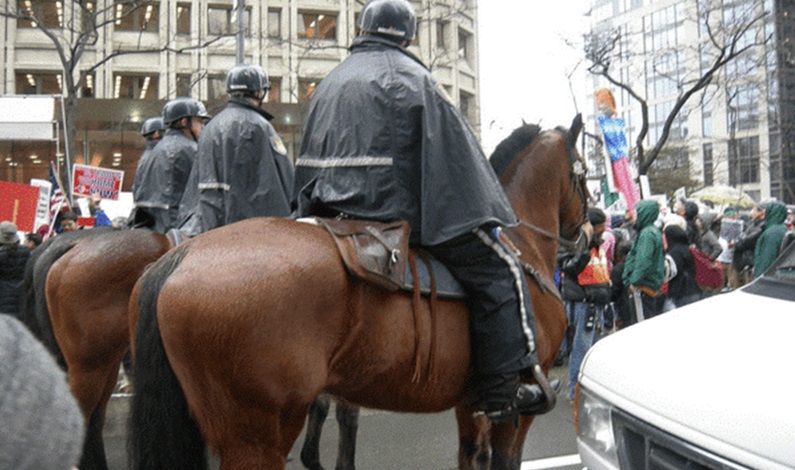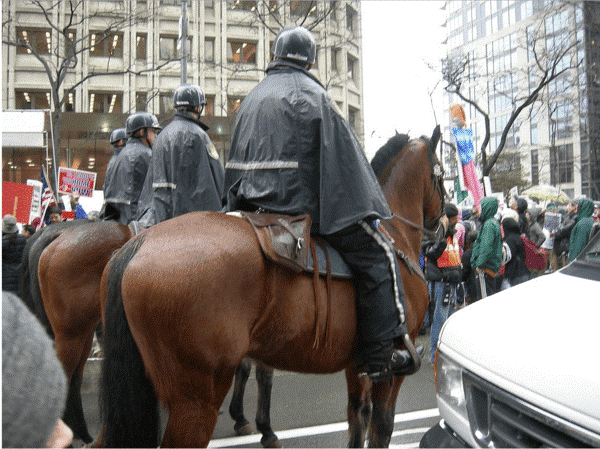
By Steve Pomper

These two stories flew onto my radar on the same day, and though only tangentially related, both tell the story of failure (or success, if the aim was to bring down the Seattle Police Department (SPD). There is the failure to honor a police department’s history, culture, cops, and their sacrifices and the failure to understand the importance of preserving what’s left and restoring what’s evaporated.
First, this might be the end of the Seattle Police Department’s (SPD) Mounted (horse) Patrol Unit. Though generous Seattleites have stepped up to keep the unit functioning over the years, the most recent rescue limiting it to more ceremonial duties, this feels as if it may be final. It doesn’t appear to be funding but a staffing issue.
Tragically, losing the popular horse unit didn’t just happen to Seattle; a leftist city cabal of officials and community activists did it to the city. They did it over many years of toxic policies that have driven away hundreds of officers and repulsed new and lateral officers from making SPD their career and Seattle their home.
Many officials responsible for the cops’ mass exodus are in the wind. Good riddance, but how convenient that is for them. Like a drive-by shooting, they caused destruction and then fled, leaving a city worse off when they left office than when they entered it. All while the people and cops continue to suffer from their malfeasance. And though some are trying to fix things, some are noticeably not. Fodder for another day.
Many of us saw this catastrophe coming decades ago and warned people this would happen if the city continued disrespecting its police department and its officers. Yes, it’s disrespectful to force partisan political propaganda and policies on cops—not to mention a bogus federal consent decree we didn’t deserve.
According to a Sept. 30th post at Westsideseattle.com, “UPDATE: Seattle’s Mounted Patrol to be shut down.” They cite information from the SPD expressing their heartbreak over deciding “to begin decommissioning our Mounted Patrol Unit over the next several months.”
It’s pathetic that with the many tumultuous events occurring in Seattle over the 150 years the mounted patrol has operated it took this recent batch of “leaders” to crush it. World wars, the Great Depression, mass protests, Earthquakes, etc., couldn’t do it, but it appears a few leftist extremists may have finally sacked the unit for good.
As the SPD explained, the Mounted Patrol Unit isn’t the kind of unit that can be scaled back or bolstered on short notice. The officers and horses have very specific needs, and the horses require care even if they’re not on duty.
The department has indicated it will reassign the unit’s officers back to patrol or detective units “to respond quickly to emergency calls and effectively investigate dangerous criminal behavior to protect the community. This requires that we reduce resources for work that does not directly support these two priorities.”
The second story involves Seattle increasing its lateral officer signing bonuses to $50,000. Before you get too excited, other Blue Cities have doubled that amount to correct the damage some officials, like those above, have inflicted nationwide.
Steve Hirjak, a now-retired SPD assistant chief, wrote a poignant, thoughtful Op-Ed to The Seattle Times (Yes, I and other SPD officers, retired and active, were shocked they’d print any cop’s perspective). Full disclosure: I met Hirjak when he was a student officer in my patrol squad. He and I later became partners at an off-duty gig for a few years.
Hirjak explains why signing bonuses will not attract new cops, and he offers suggestions that might work. His most salient point was noting that not only have officials shattered morale over the years, but also they’re still doing it even while claiming they want to prevent the flow of officers out the door and attract experienced and new officers.
The former command staffer notes that prospective officers go online and find stories about the state of the city (you’re welcome). They also speak directly with current and former SPD employees (yes, I’ve gotten calls, too) who warn them away. Perhaps most heartbreaking for officers who’ve loved the city and department, Hirjak wrote, “SPD employees warn people away when they should serve as recruiters.”
This mistreatment has been happening for a very long time. There was a time when regional officers aspired to work for the Seattle Police Department, the largest agency in the Great Pacific Northwest. The department offered all of its big-city opportunities that were the envy of smaller agencies like Mounted Patrol. Many took pay cuts by leaving the SPD.
I was there when the reverse flow began. SPD officers were leaving the department for smaller agencies that treated their officers better. This trickle would become the torrent we’ve seen more recently as the toxic, anti-cop city leadership grew. This included city council members who stood with BLM/Antifa extremists and even posted a pic on social media, while a despicable thug stood nearby taunting officers to take out their guns and shoot themselves (yes, that happened).
Hirjak wrote, “News reports still feature local activists and politicians undermining police. Officers are quickly condemned and have not been defended in any publicized incident in over 20 years. One SPD police chief bragged about displaying a box of badges from people he fired on his desk, showing pride instead of shame and an understanding of the root causes.”
Fortunately, that disgrace to his badge, which he should have also tossed into that box sooner, is gone—and in spectacular fashion, but that’s another story.
Hirjak offers other possible benefits to attract and keep officers, which have merit. Things such as fitness incentives, sabbaticals to prevent burnout, and retirement medical coverage (currently, officers who’ve served the city for decades are just cut off).
He mentions the diminished role of supervisors (primarily sergeants) who’ve seen their authority to discipline their officers (whom they know best), rather than have long drawn out, unnecessary investigations opened, virtually disappear, and have become figureheads available only for scapegoating when necessary.
He laments the disciplinary system lag time, which seems to use the process as punishment. It “leaves officers and the public in limbo for sometimes more than six months after a complaint is filed.” I know this happens. In fact, I wrote a book (shameless plug) about it.
Here’s a fitting firsthand example of Hirjak’s points from that book. “The Department allowed its Internal Investigations Section/Office of Professional Accountability (IIS/OPA) 180-day investigation into my speaking off-duty to the media to expire. And after an additional 38 days beyond that contractual limit, and having ignored IIS investigators’ recommendation of ‘Exonerated,’ OPA issued a mushy finding of, ‘Supervisory Intervention.’”
Whether driving away the beloved Horse Unit or dedicated police officers (of all ranks), it did not have to happen. City officials, spurred on by extremist anti-cop activists, intentionally inflicted this disaster on the city’s residents. For that they should be ashamed—although, I’m sure they’re not.
Make a difference. Support the NPA.